7 Site Plant Cloning Machine Easy Root Growing Hydroponics Aeroponics
Best aero cloners—top 3 cloning machines 2022. The best aeroponic cloning machines for cannabis. Root plant cuttings fast with 100% success.
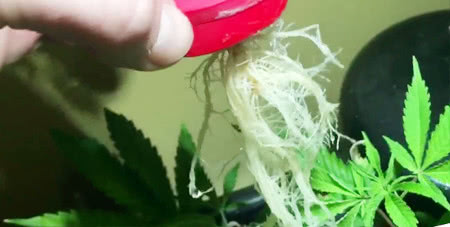
Products for sale are on top, and the cloning FAQ section is down below.
3. TurboKlone Aeroponic Cloning System
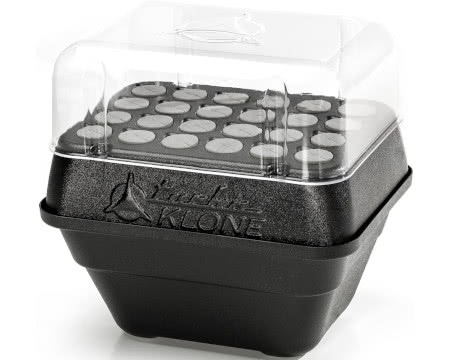
One of the best-selling clone machines for sale online, the TurboKlone system features patented fan technology that provides constant oxygen to the growing chamber, combating high temperatures that could otherwise be detrimental to roots.
Your cuttings or "clones" are suspended in plugs, while misters inside the TurboKlone continually spray water to the root zone, promoting the formation of healthy, robust root structures. Its round edge design makes cleaning easy, critical for preventing harmful bacteria growth.
The TurboKlone is sold in 24-site, 48-site, and 144-site models. It comes with plug inserts, humidity dome, and all the parts you need to get it running and root clones fast.
VIEW PRICE ►
2. Hydrofarm oxyCLONE Cloning Propagation System
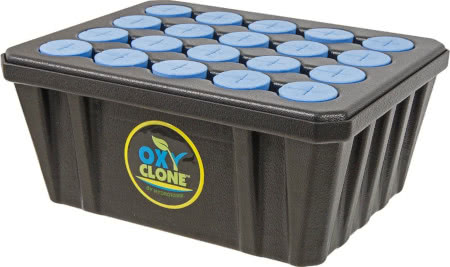
oxyCLONE is a simple, compact, recirculating clone machine that makes it easy to propagate plant cuttings, enabling you to have a perpetual garden year-round. FDA approved—the system is made of food-safe, BPA-free plastic.
Using maximum aeration to promote healthy clone roots, the Active Aqua air pump provides a constant flow of dissolved oxygen through its circular air diffuser. The oxyCERTS non-toxic EVA foam inserts provide bacterial and fungal resistance while gently holding your cuttings.
Its tabletop size and affordable price make the oxyClone system a great product to buy for cloning at home. Sold as 20-site and 40-site models. Includes everything required to operate the machine.
VIEW PRICE ►
1. Clone King Aeroponic Cloning Machine
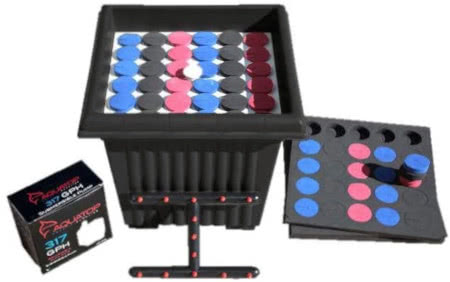
Highly reviewed by hundreds of growers, the Clone King Aeroponic Cloning Machine is a top-rated product for sale at a surprisingly low price.
With the Clone King, you get everything you need to start cloning immediately—spray manifold with 13 misters, submersible pump, and insert plugs for your plant cuttings. This true aeroponic cloning machine uses misting to provide the right conditions for roots to grow. For best results, use purified water and leave the pump on for 24 hours a day.
Easy to use and set up, get consistent 100% success rates by following a few simple directions. Available in 25-site, 36-site (most popular), and 64-site models.
VIEW PRICE ►

Why use a machine for rooting clones?
To speed up your returns. A clone machine helps get your cannabis clones rooted in less time than traditional methods (Rockwool, Jiffy pellets, perlite, vermiculite, coco, etc.). By having clones rooted earlier, you can also speed up your perpetual harvest schedule, which is why getting good healthy clones rooted fast is so important.
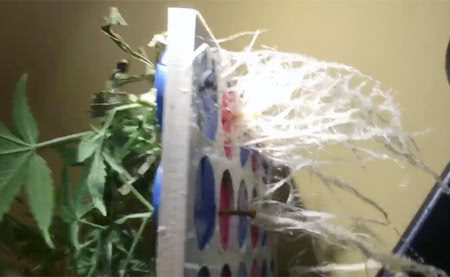
Automation is another reason to use clone machines. Instead of spray misting clones by hand and periodically checking moisture levels, simply turn on your clone machine and wait for roots to develop.
If you want to propagate marijuana clones as fast as possible, don't have the time to care for them enough, or would rather not gamble on success, then a cloning machine is a worthwhile investment.

What are the advantages of using a clone machine?
✓ Propagate healthy clones fast. Cuttings made with cloning machines root in just a couple of days. They are also less prone to wilting and disease.
✓ Grow big roots. The roots produced in a cloner grow robustly and transplant easily anywhere: soil mix, hydroponic and aeroponic growing methods.
✓ Simple operation. No need to manually mist cuttings or use humidity domes—as long as the relative humidity (RH) of your room is around 60% or higher, plant cuttings usually do best in the open air, assuming no wind or fans is pushing them.
✓ Reusable material. The neoprene plugs in a clone machine are reusable, saving you money on propagation media.
✓ Nearly 100% survival. Once you get the hang of using cloning machines, getting a near-perfect success rate is not that hard!

How does an aeroponic cloning machine work?
Plant cuttings are suspended in the cloning machine. Circular neoprene inserts support the stems. The root area is sprayed constantly inside the fixture with an oxygenated aeroponic mist, provided by misters that lie on the bottom. The frequent misting helps roots emerge quickly.
In most models, a cloning machine includes:
- a fixture with a lid
- misters
- water pump
- manifold
- power adapter
- water reservoir
- neoprene inserts
- instructions
The submerged pump drives water into the manifold with spray misters. These are pieced together into a "machine" for plant cloning.
Forget using Rockwool, foam cubes, coco coir, vermiculite, or Jiffy pellets—a clone machine outdoes virtually all the other options. Why? The secret lies in the oxygenated mist provided to cuttings. Maximum aeration plus the right amount of moisture equals rapid rooting.

Do I need to buy a timer?
Here's advice from EZ-Clone:
Running your water pump continuously is recommended though cycling your water pump may produce longer roots quicker. A thirty-minute on thirty-minute off cycle has produced the longest roots the quickest.
And here's advice from Clone King:
An aeroponic cloning machine SHOULD NEVER be run in cycles. Running in cycles came about because the ez clone pump was overkill—overheating the water and killing the clones. You won't have any overheating issues with our product. Also before anyone comments that depriving the cuttings of water causes faster root growth that is wrong. A cutting deprived of water for any period of time goes into a dormant phase to save energy it does not grow roots when in that state. A healthy cutting receiving the constant spray and food supply will produce roots faster than anything else.
All of the cloning machines described in this article can be left on 24/7 (without a timer) and yield a 100% success rate.

The best water quality for rooting clones?
Water quality is crucial when using a cloning machine for your cuttings. Make sure your water source is clean! Spring water, purified water, and filtered rainwater are all good options.
The water pH and TDS (total dissolved solids) may fluctuate during usage. Consider running the machine for a day prior to inserting clones so you may measure any possible changes and apply the necessary adjustments.
Best pH levels for the water are 5.8–6.3 with a low TDS 140–210 ppm (0.2–0.3 EC) during the start, which can be incremented up to around 500 ppm when roots are developed. Try this TDS meter on Amazon and a pH meter stick for measuring.
If using natural water sources, there may be algae and other particles that will clog up the mister sprays. An easy solution is to filter the water beforehand with a drinking water purifier.
Reverse osmosis (RO) and distilled water are usually not recommended due to how unnaturally stripped the water is of any nutrients, which may cause problems with root formation by leeching nutrients from the cuttings.
In most cases, tap water is okay to use. However, beware of hidden contaminants such as fluorosilicates, chlorine, or chloramines that may cause problems.
![]()
The best water temperature for clone machines?
It is crucial to keep the water reservoir relatively cool—the best temp range for water is between 68–75°F. Use a tank thermometer to monitor your water temperatures, and if it is getting too warm, consider moving the cloning machine to a cooler area.
Running the water reservoir too hot can be problematic, and you will have to add hydrogen peroxide or a few drops of bleach to stop unwanted bacteria from forming (a common problem with aeroponic cloning machines).
Also, you do not need to change the water in the reservoir during the propagation process. Simply fill as needed. No issues should arise unless the water gets too hot.

Grow room temp and humidity for clones?
The temperature and humidity of the area where the clones will be rooting are important. Too hot or overly dry conditions will make the clones wilt. On the other hand, if it's too cold, the production of root nubs is stunted. Because freshly cut clones do not have roots yet, any moisture lost will be hard to get back. A high relative humidity near 100% around the clones helps the cuttings keep that moisture in them. However, if it's too humid, the cuttings could develop stem rot.
The best temperature and humidity for cannabis clones are around 74–78°F at 75–85% RH.

Do I need to add nutrients or hormones?
The basic answer to this question: Rootless cuttings do not require nutrients. You don't need to add any nutrients to the water until the roots have started to develop.
After cutting clones, many cultivators apply a rooting gel such as Clonex to the root area. Keep in mind, this will get washed off and added into the water supply when the pump is turned on.
When using water devoid of minerals and nutrients (RO or distilled water), some growers like to make up for it using just a dash of liquid fertilizer or cal-mag supplement. Others swear by a few drops of vitamin B rooting hormone such as Root Juice, SuperThrive, or even sea kelp (Maxicrop). Read—Best Nutrients for Cannabis.
Nonetheless, most growers agree that pure water does the job safely and effectively. At least until the roots have grown down a few inches, then you can add your roots accelerator, silica or rapid start, etc.
Don't burn 'em up!
Do not put concentrated liquid fertilizer into the water reservoir trying to speed things up. Adding fertilizer to early cuttings is a surefire way to lose them.

What kind of light is best for clones?
Cuttings do not require much light at all to grow roots. Fluorescent bulbs, LED grow lights, or indirect light all work well. It's best to avoid intense artificial light or direct sunlight, which may be too powerful and cause wilting/damping off.
Some cultivators keep their clone machine in the corner of their main grow room, under HID lighting. The cuttings get diffused light from far away without too much intensity. This also works well, as long as the temp/humidity stays within the recommended guidelines.
Cannabis plants are photosensitive (excluding c. ruderalis aka autoflowers), responding to changes in the light hours per day. As an annual herb, cannabis has separate growth and flowering stages. Cuttings should be in their vegetative growth cycle as they are beginning their growth. It is important to make sure you have at least 16 hours of light per day on them to do this. 18 hours or more of light per day is optimal.
CFL bulbs, T5 or T12 fluorescent tubes are perhaps the best options for rooting clones. The fluorescent light is mellow enough to keep it on non-stop without worrying about overpowering your cuttings. Hang the lights 5–8 inches (13–20 cm) above clones for best results.
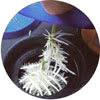
How long to wait for rooting and transplant?
Operate the cloning machine for 24 hours per day, nonstop, until roots visibly appear from the cuttings. You want the roots around 1½–2 inches (3.5–5 cm) before transplanting. In most cases, cuttings should be ready to transplant within 7–10 days.
Some cultivators like to wait until the roots have really been established well for a stronger start from the root system.

So is it aeroponic or hydroponic?
Hydroponics is defined as growing plants directly in water, without any soil. Roots are submerged in constantly aerated water.
In Aeroponics, the roots of a plant hang freely, never being submerged in water. A drizzle or mist feeds the roots water and nutrients.
Sometimes aeroponics is described as a subset of hydroponics due to the water being used. The confusion leads to many aeroponic machines being labeled as hydroponic.
Most professional clone machines are purely aeroponic designs. This includes any cloning machine that relies on a misting system. The roots of the cuttings hang freely and are misted regularly.
DWC (deep water culture) cloners, aka "Bubble cloners," are a type of cloning machine that is considered hydroponic. These are the easiest to build at home and are simply a bucket or tub of water aerated with air stone pumps. Holes are drilled in the top lid for plugs and cuttings. The cuttings' roots are often submerged in the water with bubble cloner machines, but not always. Read—DIY Hydroponic System.
Aeroponic clone machines are the best-reviewed among growers for producing robust, healthy roots.

Clones not rooting?
If your clones are not rooting in the clone machine, there may be a few contributing factors:
- Clones were not cut clean
- Bad water quality
- Inadequate misting
- Too much light
- Too much nutrients
- Bacteria in the cloner
- pH levels are off
Best pH for clones: 5.8–6.3
How to make clones root faster?
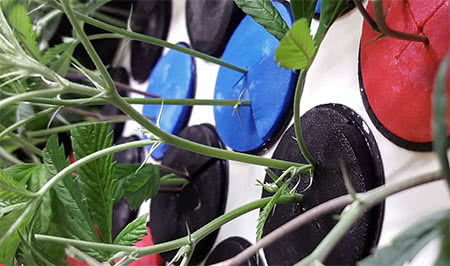
Weed Cloning Tips
- Slicing clones at a 45° angle with a sharp blade will ensure the cleanest cut with a healthy amount of surface area for roots. Many growers slit the sides of the stems additionally.
- Use purified water, if possible. Although many growers use tap water, your success depends on the local tap water quality. Bacteria is the main enemy with contaminates, pH and PPM levels also being of concern.
- Misting for 1 minute on/1 minute off or other similar techniques used with a timer can be fun to experiment with. However, if you can't afford to lose the clones, it's best just to keep the misters spraying all of the time.
- Light needs only to be supplied in small amounts; that's why fluorescent lights are recommended. Overdoing the light supply may cause the cuttings to burn up.
- Nutrients do not need to be provided for roots to emerge from the cuttings. Although what's increasingly popular among growers is to add a diluted nutrient solution to the water slowly as roots begin to grow. Just remember not to add too much, or it can stunt root growth.
- If you are using the same water repeatedly for cloning, bacteria may naturally build up unless there is some cleansing agent added to the water. Go back and review cloning water quality. If you're still having trouble, consider cleaning out the whole machine and starting over with new water.
Best Aeroponic Cloner Shortlist

Disclaimer: We do not promote or undertake in illegal activity.
Source: https://moldresistantstrains.com/3-best-aeroponic-cloning-machines-reviewed-faq/
0 Response to "7 Site Plant Cloning Machine Easy Root Growing Hydroponics Aeroponics"
Postar um comentário